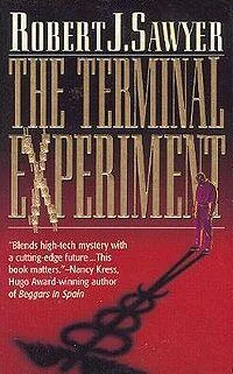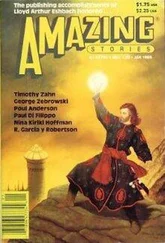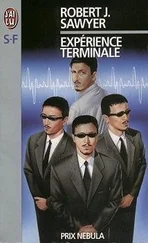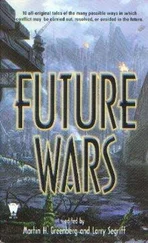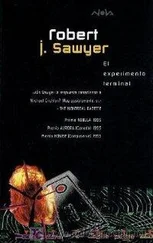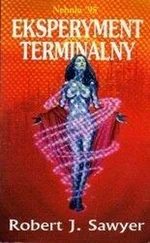Robert Sawyer - The Terminal Experiment
Здесь есть возможность читать онлайн «Robert Sawyer - The Terminal Experiment» весь текст электронной книги совершенно бесплатно (целиком полную версию без сокращений). В некоторых случаях можно слушать аудио, скачать через торрент в формате fb2 и присутствует краткое содержание. Год выпуска: 1995, ISBN: 1995, Издательство: Harper Prism, Жанр: Фантастика и фэнтези, на английском языке. Описание произведения, (предисловие) а так же отзывы посетителей доступны на портале библиотеки ЛибКат.
- Название:The Terminal Experiment
- Автор:
- Издательство:Harper Prism
- Жанр:
- Год:1995
- ISBN:0-06-105310-4
- Рейтинг книги:5 / 5. Голосов: 1
-
Избранное:Добавить в избранное
- Отзывы:
-
Ваша оценка:
- 100
- 1
- 2
- 3
- 4
- 5
The Terminal Experiment: краткое содержание, описание и аннотация
Предлагаем к чтению аннотацию, описание, краткое содержание или предисловие (зависит от того, что написал сам автор книги «The Terminal Experiment»). Если вы не нашли необходимую информацию о книге — напишите в комментариях, мы постараемся отыскать её.
magazine in the mid-December 1994 to March 1995 issues, under the name
, before its first novel publication in May, 1995.
Won Nebula Award for Best Novel in 1995.
Nominated for Hugo Award for Best Novel in 1996.
The Terminal Experiment — читать онлайн бесплатно полную книгу (весь текст) целиком
Ниже представлен текст книги, разбитый по страницам. Система сохранения места последней прочитанной страницы, позволяет с удобством читать онлайн бесплатно книгу «The Terminal Experiment», без необходимости каждый раз заново искать на чём Вы остановились. Поставьте закладку, и сможете в любой момент перейти на страницу, на которой закончили чтение.
Интервал:
Закладка:
That night, Cathy and Peter saw that the CBC TV story was picked up by CNN in the States and the BBC World Service. The announcement was all over the net within hours and made front-page news in the evening editions of the Toronto Star and several American papers, and was plastered across page one of newspapers around the world the next day. Within twenty-four hours, the entire developed world knew about the discovery.
Suddenly Peter Hobson was a celebrity.
“Is the caller still there?” asked Donahue, back on daytime TV after his failed presidential bid.
“I’m here, Phil.”
Donahue made his tortured face; precious seconds were being wasted. “Go ahead — I have very little time.”
“What I’d like to know,” said the caller’s voice, “is what life after death is really like. I mean, we know now that it exists, but what’s it really like?”
Donahue turned to Peter. “That’s a very good question, caller. Dr. Hobson — what is the afterlife like?”
Peter shifted in his chair. “Well, that’s more a subject for philosophers, I’m afraid, and—”
Donahue turned toward the studio audience. “Audience, are we prepared for these questions? Do we really want to know the answers? And what will America do if the afterlife turns out to be unpleasant?” He spoke into the air. “Show ’em, Bryan — number 14.”
A chart appeared on the screen. “Sixty-seven percent of the people of this good country,” said Donahue, “believe that the soulwave proves the Judeo-Christian model of a heaven and a hell. Only eleven percent believe that your discovery, Dr. Hobson, disproves that model.”
The chart disappeared. Donahue spied a raised hand in the back of the studio. Still spry at seventy-five, he bolted for the back row and shoved a microphone under a woman’s chin.
“Yes, ma’am. You had a brief comment.”
“That’s right, Phil. I’m from Memphis — we love your show down there.”
First the little-boy face, patted on the head. “Thank you, ma’am.” Then the pained face, as if something was caught going down his gullet. “I have very little time.”
“My question is for the doctor. Do you think your discovery is going to get you into heaven, or are you going to hell for interfering in God’s mysteries?”
Close-up on Peter. “I — I have no idea.”
Donahue did his standard theatrical arm gesture that ended with his finger pointing directly into the camera. “And we’ll be back…”
The silver-haired Latin fox turned to face the audience. According to the tabloids, he’d recently undergone the Life Unlimited process, so viewers had centuries of his particular brand of television to look forward to.
“Life after life,” he said, portentously. “That’s our focus on this edition of Geraldo . Our guests today include Peter Hobson, the Ottawa scientist who claims to have captured the immortal soul on film, and Monsignor Carlos Latina of the Archdiocese of Los Angeles.” Geraldo turned to the man wearing a black cassock. “Monsignor — where do you think the souls are today of those clergy members who molested boys in church-run orphanages?”
(Roll computer graphic of Capitol Building dome. Cue music.) Announcer: “From ABC News: This Week with Peter Jennings . Now from our Washington headquarters, here’s Peter Jennings.”
Jennings, gray haired, dour, facing into the camera: “The soulwave — fact or fantasy? Religious revelation or scientific truth? We’ll ask our guests: Peter Hobson, the engineer who first detected the soulwave; Carl Sagan, author of the best-selling Eyes of Creation ; and Helen Johannes, presidential advisor on religion in America. Some background on all this from our man Kyle Adair. And joining me in our Washington studio will be—”
(Medium shot of Donaldson, his features sharp despite his wrinkles; his shoe-polish brown toupee looking obviously fake.)
“Sam Donaldson—”
(Medium shot of silver-haired Will, walleyed and bow-tied, looking like a retired plantation owner.)
“ — and George Will. Later, we’ll be joined by commentator Sally Fernandez of the Washington Post … all here on our Sunday program.”
(Run commercials: Archer Daniels Midland’s new all-vegetable automobile. General Dynamics — “our work may be classified, but we’re a good corporate citizen.” Merrill Lynch — “because someday the economy will turn around.")
(Roll prerecorded backgrounder.)
(Fade up in studio.)
Jennings: “Kyle, thank you.”
(Recap guests and panelists.)
(Insert Peter Hobson on wall monitor, with dateline display at top showing “Toronto.")
Sam Donaldson, leaning forward: “Professor Hobson, your discovery of the soulwave could be seen as a great liberator of oppressed people, final proof that all men and women are created equal. What effect do you think your discovery will have on totalitarian regimes?”
Hobson, politely: “Excuse me, but I’m not a professor.”
Donaldson: “I stand corrected. But don’t duck my question, sir! What effect will your discoveries have on the human-rights violations going on in the eastern Ukraine?”
Hobson, after a moment’s reflection: “Well, I’d love to think that I’ve struck a blow for human equality, of course. But it seems that our ability to be inhuman has survived every challenge to it in the past.”
George Will, over steepled fingers: “Dr. Hobson, the average American, struggling under the burden of an excessive government with a ravenous appetite for tax dollars, cares not one whit about the geopolitical ramifications of your research. The average church-going American wants to know, in precise and plain language, sir, exactly what characteristics the afterlife actually has.”
Hobson, blinking: “Is that a question?”
Will: “It is the question, Dr. Hobson.”
Hobson, shaking head slowly: “I have no idea.”
CHAPTER 16
Peter was not about to let his newfound celebrity interfere with his Tuesday evening dinners with Sarkar at Sonny Gotlieb’s. But he did have something very specific that he wanted to explore with Sarkar, and he began without preamble. “How do you create an artificial intelligence? You work in that field — how do you do it?”
Sarkar looked surprised. “Well, there are many ways. The oldest is the interview method. If we wanted a system to do financial planning, we would ask questions of several financial planners. Then we reduce the answers as a series of rules that can be expressed in computer code — ‘if A and B are true, do C.’”
“But what about that scanner my company built for you? Aren’t you doing full brain dumps of specific people now?”
“We’re making good progress toward that. We’ve got a prototype called RICKGREEN, but we’re not ready to go public with it. You know that comedian, Rick Green?”
“Sure.”
“We did a full scan of him. The resulting system can now tell jokes that are just as funny as the ones the real Rick tells. And by giving it access to the Canadian Press and UPI news feeds, it can even generate new topical humor.”
“Okay, so you can essentially clone in silicon a specific human mind—”
“Get with the twenty-first century, Peter. We use gallium arsenide, not silicon.”
“Whatever.”
“But you have hit upon what makes the problem crisp: we are just at the point where we can clone one specific human mind — a shame that such a technique did not exist in time to scan Stephen Hawking. But there are very few applications in which you want the knowledge of just one person. For most expert systems, you really want the combined knowledge of many practitioners. So far, there is no way to combine, say, Rick Green and Jerry Seinfeld, or to build a combined Stephen Hawking/Mordecai Almi neural net. Although I had high hopes for this technology, I suspect most of the contracts we’ll get will be for duplicating the brains of autocratic company presidents who think their heirs are going to be interested in what they have to say after they’re dead.”
Читать дальшеИнтервал:
Закладка:
Похожие книги на «The Terminal Experiment»
Представляем Вашему вниманию похожие книги на «The Terminal Experiment» списком для выбора. Мы отобрали схожую по названию и смыслу литературу в надежде предоставить читателям больше вариантов отыскать новые, интересные, ещё непрочитанные произведения.
Обсуждение, отзывы о книге «The Terminal Experiment» и просто собственные мнения читателей. Оставьте ваши комментарии, напишите, что Вы думаете о произведении, его смысле или главных героях. Укажите что конкретно понравилось, а что нет, и почему Вы так считаете.
